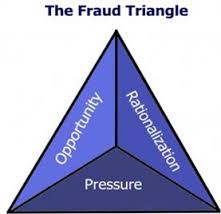Why people commit fraud?

Hi Steemians,
Before i dive into it, there are two kinds of fraudsters out there;
- Accidental fraudster
- Predator Fraudster
I will show/explain the difference(s) shortly.
Donald Cressey, an American criminologist came up with the hypothesis that for one to commit fraud, three components have to be present.
- Pressure: Pressure is what causes a person to commit fraud. Pressure can include.
- Gambling debt
- Late Loan settlement
- Due Rent
Opportunity: Weaknesses in internal controls. An example would be in an organisation where one person does both requesting, authorizing, payment and receipt of items. That in itself is a flaw.
Rationale: Most fraudsters (accidental fraudsters) feel "bad" after committing the fraud. To get rid of that emotion, they usually come up with excuses like;
- I will pay it back tomorrow/next week
- I've been working for this company for a very long time with no increment.
- I'm taking what is rightfully mine.
- No one will see, its only $30.
THIS CONCEPT IS KNOWN AS THE FRAUD TRIANGLE

Now, Cresseys concept only explains the accidental fraudster.
Predator fraudsters on the other hand do not need any pressure or rationale to commit the fraud.. All they need is the opportunity to do so. Hence the name PREDATOR.
Predator fraudsters are constantly looking for opportunities to exploit.
I am almost completely sure that this often happens precisely because people simply do not have other types of earnings. This is a forced measure to which they resort. No, I'm not defending them in any way. I'm just trying to explain my understanding of this situation. But that's one thing. And when people who already have money and power are engaged in fraud, then you need to act differently. For example, in this case I hired people from a private agency https://corporateinvestigation.com/corporate-private-investigator/
Hi! I am a robot. I just upvoted you! I found similar content that readers might be interested in:
https://internalaudit.boisestate.edu/wp-content/uploads/2011/05/FraudTriangleRedFlags.pdf
Pardon me for asking a dumb question, but doesn't telling people up front that you've "been in the fraud domain for a little over 5 years" diminish your success?
I'm suspicious already. ;-)
Thanks for the concern @theblindsquirl. May be i shouldn't put it out there ;)
I'm thinking of doing my ACFE. Upvoted, thanks!
I will be posting more, so please follow me to get all the updates. Good luck with your exam. Before that i would advise you try tackling Forensic Accounting and Fraud at https://www.coursera.org/learn/forensic-accounting
Congratulations @mozy! You have completed some achievement on Steemit and have been rewarded with new badge(s) :
Click on any badge to view your own Board of Honnor on SteemitBoard.
For more information about SteemitBoard, click here
If you no longer want to receive notifications, reply to this comment with the word
STOPBy upvoting this notification, you can help all Steemit users. Learn how here!
interesting breakdown of the subject matter.